
On November 1, the Fintech Wealth Summit co-organized by Xinhuo Asset Management and ChainUp Investment came to a successful conclusion at the Ritz-Carlton, Hong Kong.
The Fintech Wealth Summit focused on many key topics, including exploring new narratives in digital finance, asset allocation strategies under interest rate cut cycles, the combination of RWA and the real world economy, and how institutional information shapes the future of the crypto industry. It also invited Mr. Hanjing Liang, Global President of Financial Services, Technology and Sustainability at Invest Hong Kong, Mr. Huihong Ma, Founding Partner of CSI Group & Member of CAIA Global Board, Mr. Dehui Liu, Director of Emperor Wealth Management, Mr. Juanyong Tam, Co-founder of Wanfang Family Office and CEO of Wanwei Digital Family Office, Mr. Dominic Maffei, Head of Digital Assets and Fintech at Standard Chartered Hong Kong, Mr. Chao Wu, Chairman of Goldwin Securities & Goldwin Technology, Mr. Zhu Liu, Director of FTSE Russell Index Business, and Mr. Dian Wang, Head of Sales and Customer Service at Bosera International, and other authoritative leaders in the traditional financial field to attend the conference.
At the beginning of the conference, Mr. Liang Hanjing, Global President of Financial Services, Technology and Sustainability of Invest Hong Kong, delivered an opening speech, sharing the new trends and technologies at the forefront of the market that he is currently paying attention to.

Jennifer Leung, Global Head of Financial Services, Technology and Sustainability, InvestHK
Liang Hanjing said in his speech that the development of the Web3 industry has mainly had the following three cutting-edge trends: First, the virtual asset management business. Currently, many traditional institutions and those "old money" are very optimistic about this track, and Hong Kong is at the forefront of the world in terms of policy support and product design in this field. Therefore, it can be seen that in the past period of time, many traditional foreign financial institutions are very eager to cooperate with Asian institutions. For example, in investing in Bitcoin and Ethereum spot ETF products, they are very eager to sell these compliant ETF products to high-net-worth clients in Europe through the packaging of traditional financial institutions.
Secondly, Liang Hanjing believes that the tokenization of the real economy is the second largest potential direction for the development of the Web3 industry. For example, RWA (real world assets) and STO (security token issuance), some leading financial institutions such as Fidelity, HSBC, and JP Morgan are rapidly entering this field, which is estimated to generate business opportunities of 400 billion US dollars. The third potential direction shared by Liang Hanjing is digital currency payment and stablecoin.
Sailor Zhong, founder and CEO of ChainUp and shareholder of New Fire Technology, delivered a speech on behalf of the conference organizer. He shared the wonderful journey of ChainUp from its early days to becoming an industry leader today, and expressed optimism about the development prospects of Hong Kong's Web3 industry.

Sailor Zhong, Founder and CEO of ChainUp
Sailor said that ChainUp entered the field of virtual asset management in 2021, providing compliant asset management services to high-net-worth clients, and successfully broke through the barriers between traditional finance and virtual assets. He believes that Hong Kong has unique advantages in this field, including rich experience, open policies, sufficient talents and superior geographical location, and has great development potential. Sailor also shared his views on the current virtual asset market cycle. Sailor believes that the virtual asset market has shifted from early retail-driven to institutional-led. Institutional investors pay more attention to compliance, which makes compliant asset management business an important direction for future development. Bitcoin has performed outstandingly in the last two bull market cycles, thanks to the continuous inflow of institutional funds.
The first roundtable discussion of the conference was themed "From Policy Compliance to Technological Innovation, Exploring a New Narrative of Digital Finance", which explored the latest trends in the current digital financial field and the development of compliance in the Hong Kong crypto industry. Mr. Albert Yip, Chairman of Syndicate Capital Group, was invited as the moderator of the roundtable, and Mr. Dominic Maffei, Head of Digital Assets and Fintech at Standard Chartered Hong Kong, Mr. Tam Chun-wing, Co-founder of Wanfang Family Office and CEO of Wanwei Digital Family Office, Mr. Steve Zeng, Managing Director of Futu Group, and Mr. Ignious Yong, Senior Advisor of Bigo Holdings (8220.HK), were invited as roundtable discussion guests.
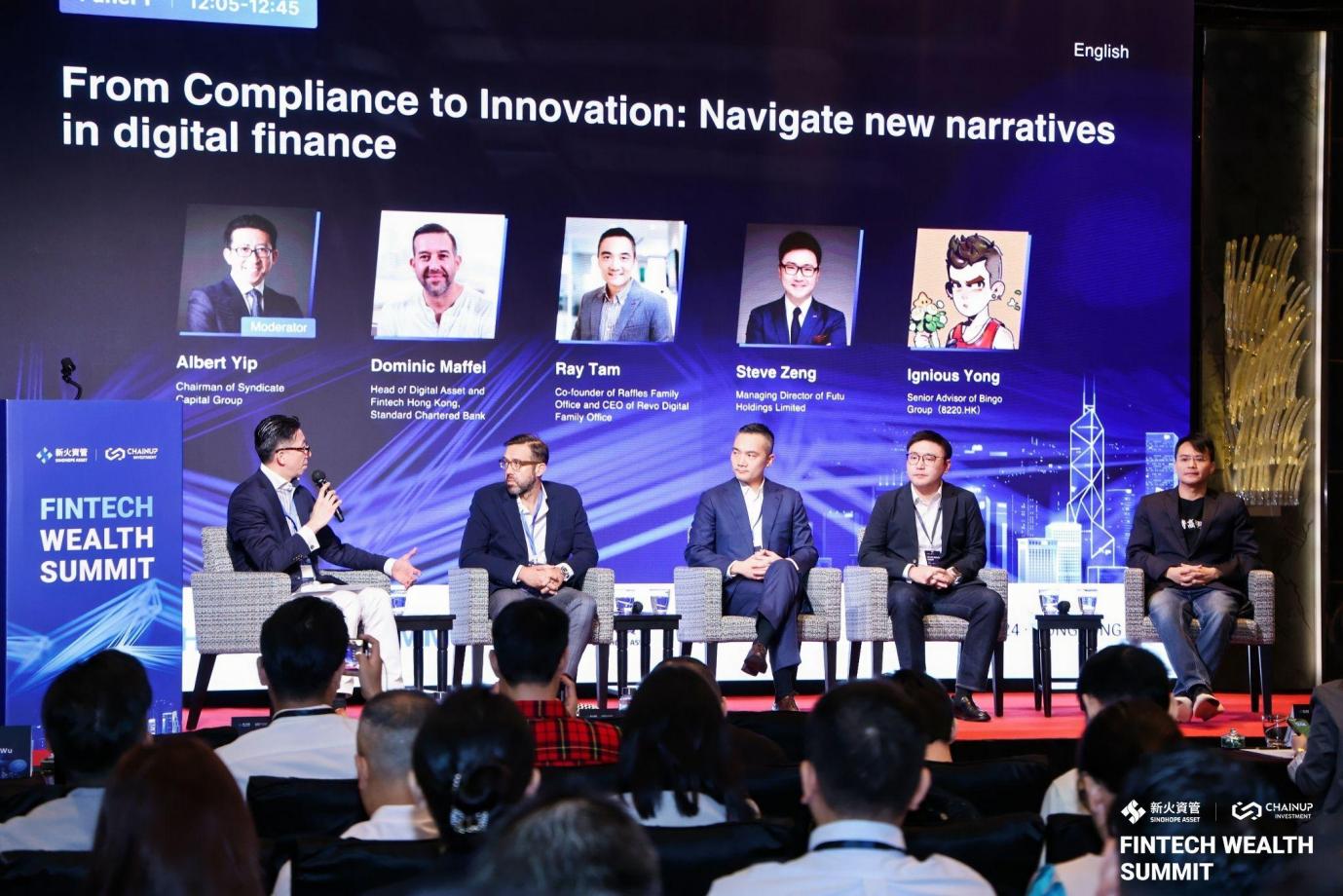
Mr. Dominic Maffei said at the roundtable that the issuance of Bitcoin and Ethereum spot ETFs is a huge step forward in the history of the crypto industry. Previously, ETFs had been rejected many times due to the operational risks of crypto assets. However, in order to make crypto assets an epic investment asset, this operational risk needs to be reduced. Institutional-level custodial wallets can protect the security of customers' crypto assets at a higher level, allowing you to better use crypto assets in your daily life.
Mr. Tan Junyong said at the roundtable that Bitcoin and Ethereum spot ETF products provide a particularly good opportunity for traditional family offices and traditional institutional investors to enter the Web3 market, especially those institutional investors who have not been exposed to crypto assets before. Crypto assets can help them enrich their investment targets and better manage their investment assets. Finally, Mr. Tan Junyong believes that it is the company's mission to assist customers in passing on crypto assets to the next generation of the family. In this process, the family must deal with inheritance challenges in a timely manner and cultivate the next generation's sense of succession with persistence and confidence.
Mr. Steve Zeng said at the roundtable that Futu announced that it would provide investors with relevant ETF trading products and services after the Bitcoin and Ethereum spot ETFs were just approved. It is the first brokerage firm in Hong Kong to provide zero-commission cryptocurrency trading, providing investors with safe and licensed services. Secondly, Steve mentioned that the application direction of asset tokenization is an important direction for the combination of encrypted assets and the real world, and it has a very large market prospect and scale in the future.
Mr. Ignious Yong said at the roundtable that the approval of Bitcoin and Ethereum spot ETFs will bring a "super cycle" prosperity to the crypto industry in the next five to ten years, mainly for the following three reasons: 1. The entry of traditional institutional investors such as Microstrategy; 2. The younger generation is becoming more and more accepting of crypto asset investment. In their view, investing in cryptocurrencies is like investing in the stock market, which is a very widespread investment behavior; 3. The combination of the real-world economy and asset tokenization drives the large-scale application of crypto assets and blockchain, such as TON and Telegram. TON's innovation has the potential to directly convert Telegram's 900 million users worldwide into crypto asset users.
At the beginning of the afternoon meeting, Mr. Guo Junxiu, CEO and founder of Elven, gave a speech on the theme of "Optimizing the configuration and reconciliation process of crypto assets through Elven financial software". He used asset management industry cases to show users on site how to automatically generate position tables, refine profit and loss statements, optimize reconciliation processes and other functions, and Elven helps crypto asset managers achieve data integration and refined financial analysis. He also introduced how Elven helps OTC, payment, exchanges, project parties and other institutions meet the needs of license compliance, auditing and financial automation. Elven's typical customers include more than 800 Crypto companies such as Amber, Hashkey, Coinhako, Legend Trading, Alchemy Pay, DTCPay, Nansen, Audit Aliance, etc.
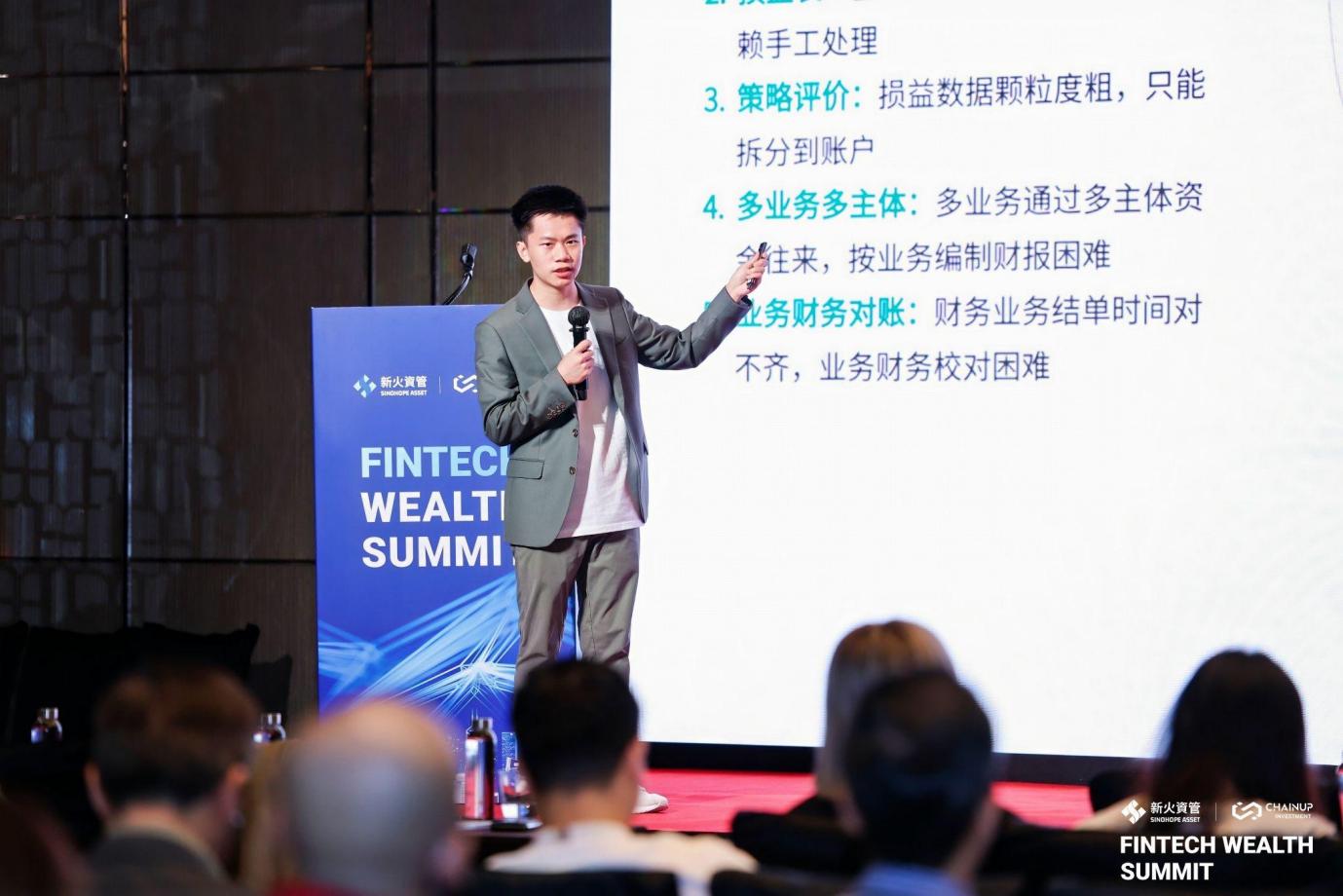
Elven CEO and Founder Junxiu Guo
Afterwards, Ms. Emma Zhu, partner of New Fire Asset Management, delivered a speech on the theme of "New Fire Asset Management's New Journey in 2024". Emma introduced the past development history and future business planning of New Fire Asset Management. New Fire Asset Management currently holds Type 1 (Securities Trading), Type 4 (Providing Advice on Securities) and Type 9 (Asset Management) licenses issued by the Hong Kong Securities and Futures Commission ("SFC"). It is the first licensed institution in Hong Kong to provide virtual asset full-power account management services and is approved to manage investment portfolios that invest 100% in virtual assets.
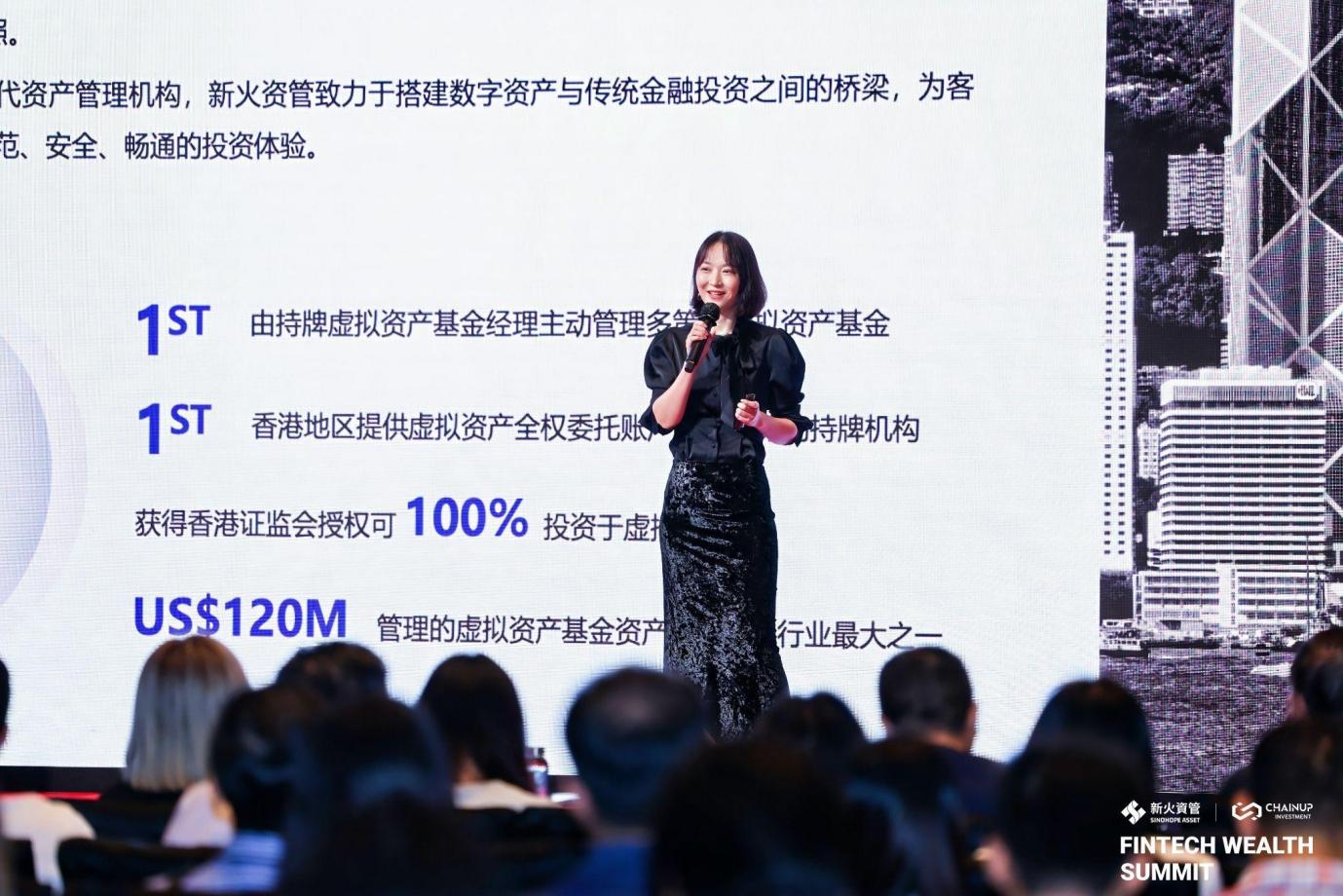
Emma Zhu, Partner of New Fire Asset Management
The second roundtable discussion of the conference was on the topic of "In the new round of interest rate cuts, how do investors allocate various assets?" Uweb partner Romeo Wang was invited as the roundtable moderator, and Gaoying Securities & Gaoying Technology Chairman Wu Chao, Avenir CRYPTO CEO Lan Jianzhong, Xinjia Wealth Securities Product Research Department Executive Director Song Lei, Emperor Wealth Management Director Terry Lau and Doo Group CEO Windson Chan were invited as roundtable discussion guests.
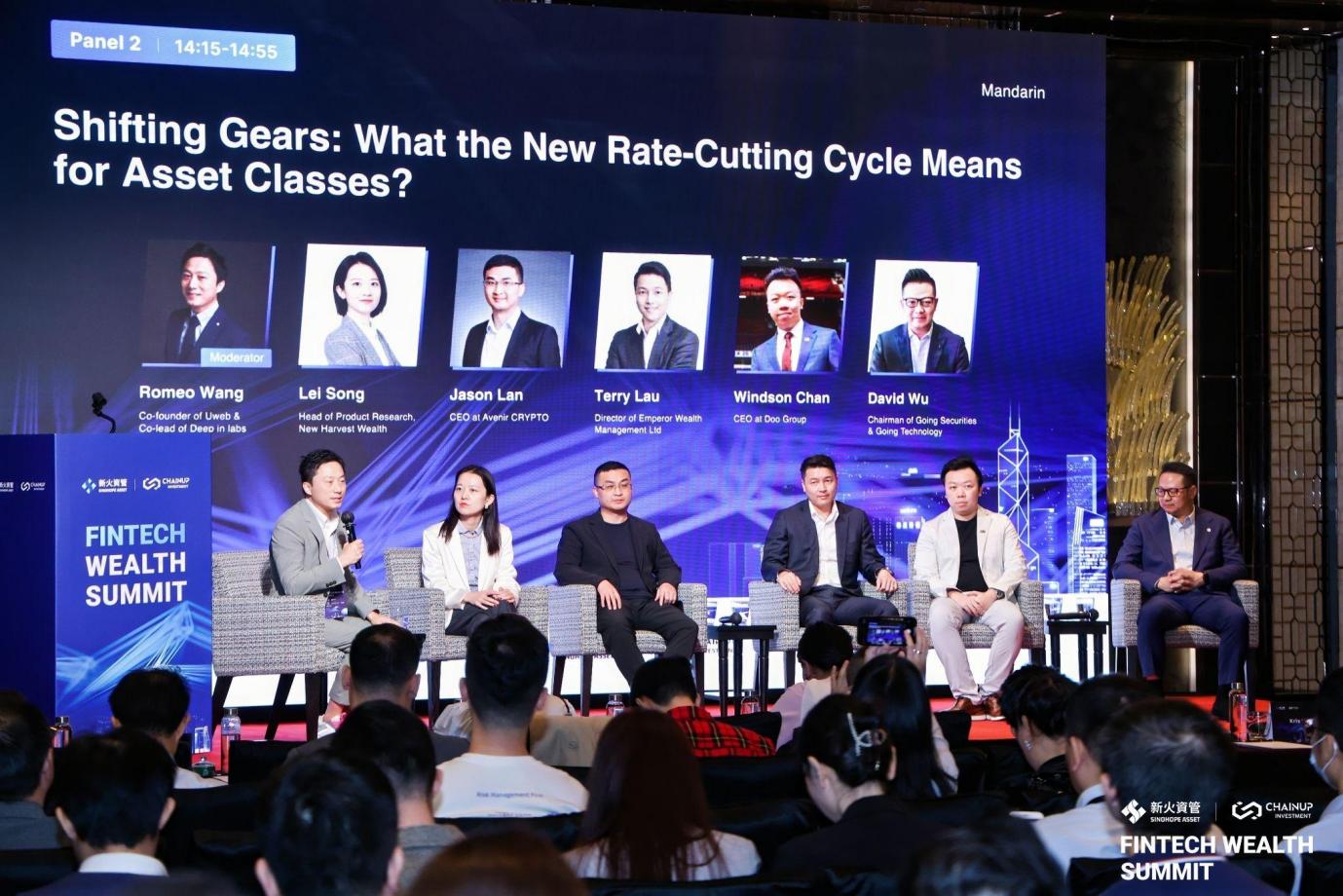
Ms. Song Lei said at the roundtable that asset allocation is mainly based on customer expectations, risk tolerance, and liquidity needs. Interest rate cuts are beneficial to stock valuations. You can focus on overweighting consumption, high dividends, small-cap stocks, etc. that have lagged behind in the past few years. Interest rate cuts are also positive for bonds and gold. From the perspective of asset allocation, leaving aside macro factors and looking for assets with long-term growth logic, overseas hedge funds and some funds with semi-liquidity strategies in the primary market are more suitable for bottom-line allocation for customers, which will achieve certain returns and profit targets.
Mr. Lan Jianzhong said at the roundtable: With the Fed's interest rate cut, global liquidity has entered a new easing cycle, which means that the attractiveness of risky assets is increasing. In such an environment, Bitcoin, as a unique asset class, is expected to perform well under the condition of abundant global liquidity, so it should be given a higher weight in the investment portfolio. At the same time, we also need to pay close attention to the Fed's decision-making and market reactions, so as to adjust investment strategies in a timely manner and flexibly respond to possible changes.
Mr. Terry Lau said at the roundtable that with the approval of ETFs, crypto assets are becoming more and more legitimate, and the impact curve of interest rate cuts on crypto assets will become more and more like traditional financial assets. For example, Bitcoin will move with the rise and fall of the Nasdaq, and their correlation will become closer and closer, and their asset allocation will also become closer and closer.
Mr. Windson Chan said at the roundtable that the most inflation-resistant thing in human history is "bricks" (real estate). He believes that currently people still have a large proportion of their assets invested in non-financial fields. In an environment of interest rate cuts, the cost of holding real estate for residents will be reduced, and residents will be more willing to leverage to buy houses, which is a huge benefit to the real estate and real economy industries.
Mr. Wu Chao said at the roundtable that with the arrival of interest rate cuts, the US dollar will continue to flow out, and the US stock market is a long-term bull market. Although the current interest rate cut will bring about a short-term adjustment, there will still be a certain amount of room for growth after the adjustment. Mr. Wu Chao believes that commodities denominated in US dollars will inevitably strengthen, and interest rate cuts will lead to the restoration of many products, and the demand for commodities will increase, which will lead to an increase in commodity prices. Bitcoin is a good collector of over-issued US dollars, so its price will rise further as the US dollar further cuts interest rates.
Afterwards, Ms. Joyce Zhou, founder and COO of QIN AWAKENING, gave a keynote speech on "The Infinite Possibilities of IP&RWA", shared the company's IP project - "Qin Tide Awakening Overseas Web3.0 Distribution Plan", and deeply analyzed the IP+RWA (real world assets) innovation model adopted by the "Qin Tide Awakening" project. Under the guidance of a global vision, more ordinary consumers can participate more conveniently and with lower thresholds. Qin Tide Awakening's ticket sales, write-offs, authorizations, etc. are all combined with blockchain modules. Each transaction is chained to ensure authenticity, transparency, and security, combined with the natural attributes of blockchain technology to ensure the security and compliance of the project. In addition, Joyce also demonstrated the innovation and expansion of "Qin Tide Awakening" in the business model. From offline physical stores to NFT, chain games, Depin hardware, and peripheral derivatives, "Qin Tide Awakening" is constantly exploring and practicing, aiming to build a comprehensive and multi-dimensional IP ecosystem.

Joyce Zhou, Founder and COO of QIN AWAKENING
ChainUp Investment CEO Mr. Kris Li also delivered a keynote speech on site, sharing ChainUp Investment's investment strategy and achievements in the current market cycle.
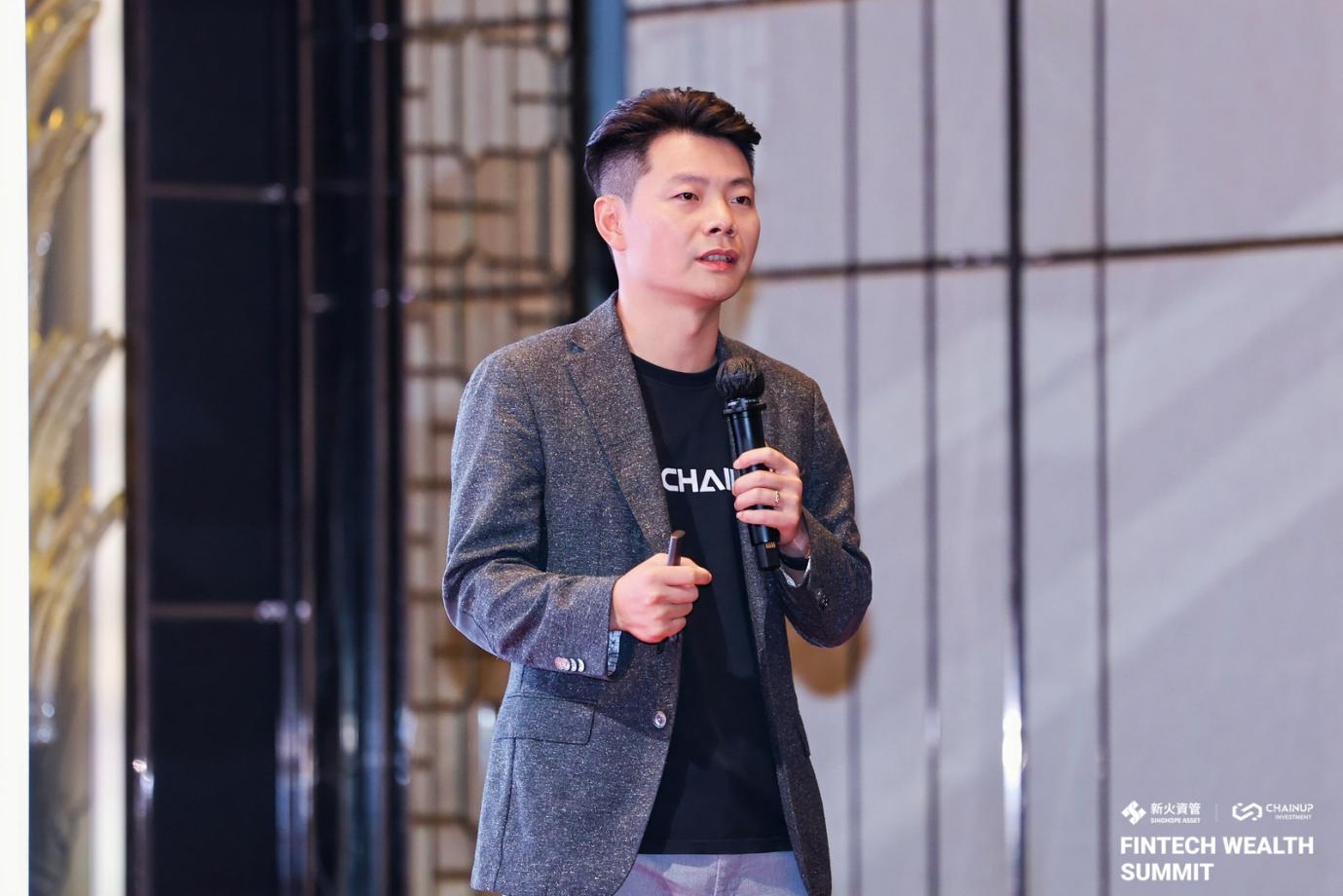
ChainUp Investment CEO Kris Li
The third roundtable discussion of the conference was on the topic of "How do tokenized financial assets and spot ETFs affect investors' investment sentiment towards Bitcoin?" Ms. Emma Zhu, partner of Xinhuo Asset Management, served as the moderator of this roundtable. Mr. Ma Huihong, founding partner of Si Rui Group and member of CAIA Global Board of Directors, Dr. Pan Leming, Executive Vice Chairman of the Asian Family Office Association, Mr. Liu Zhu, Director of FTSE Russell Index Business, Mr. Wang Dian, Head of Sales and Customer Service of Bosera International, and Mr. Terence Pu, Head of Custodian Services (RO) of HashKey Exchange, were invited as roundtable discussion guests.
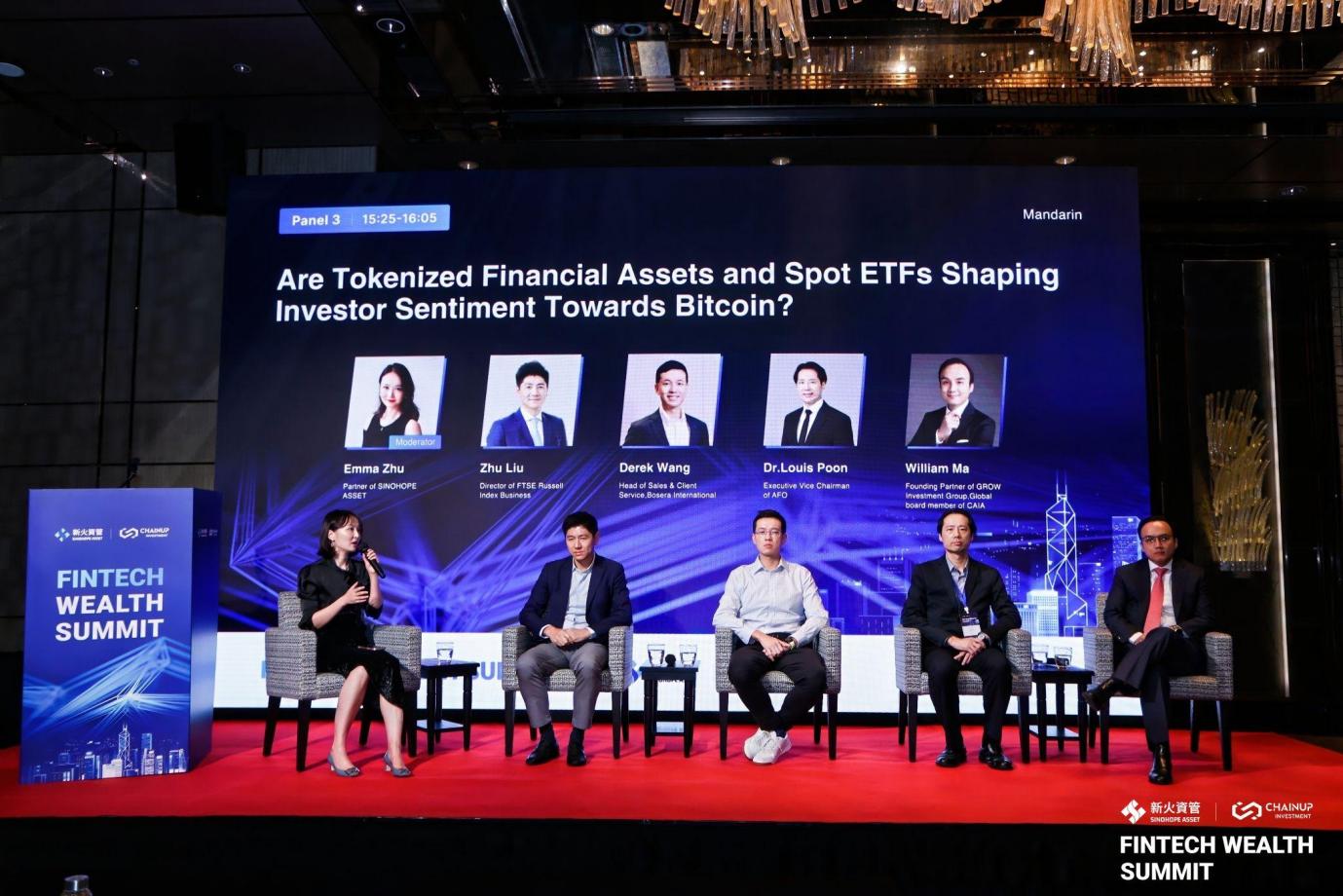
The last part of the conference was a roundtable discussion on the topic of "Building Bridges: How Institutional Confidence Shapes the Future of Cryptocurrency Applications?", and invited Lu Dongquan, Vice President of Progression Asset Management Ltd.
Mr. served as the moderator of the roundtable, and Mr. Zhang Guoyao, partner of Deloitte Strategic Client Center, Dr. Yu Jianing, founder of Uweb, Shirley Ma, deputy chief operating officer of Fosun Wealth Holdings, and Mr. Ivan Chan, senior director of BitGo, served as roundtable discussion guests.
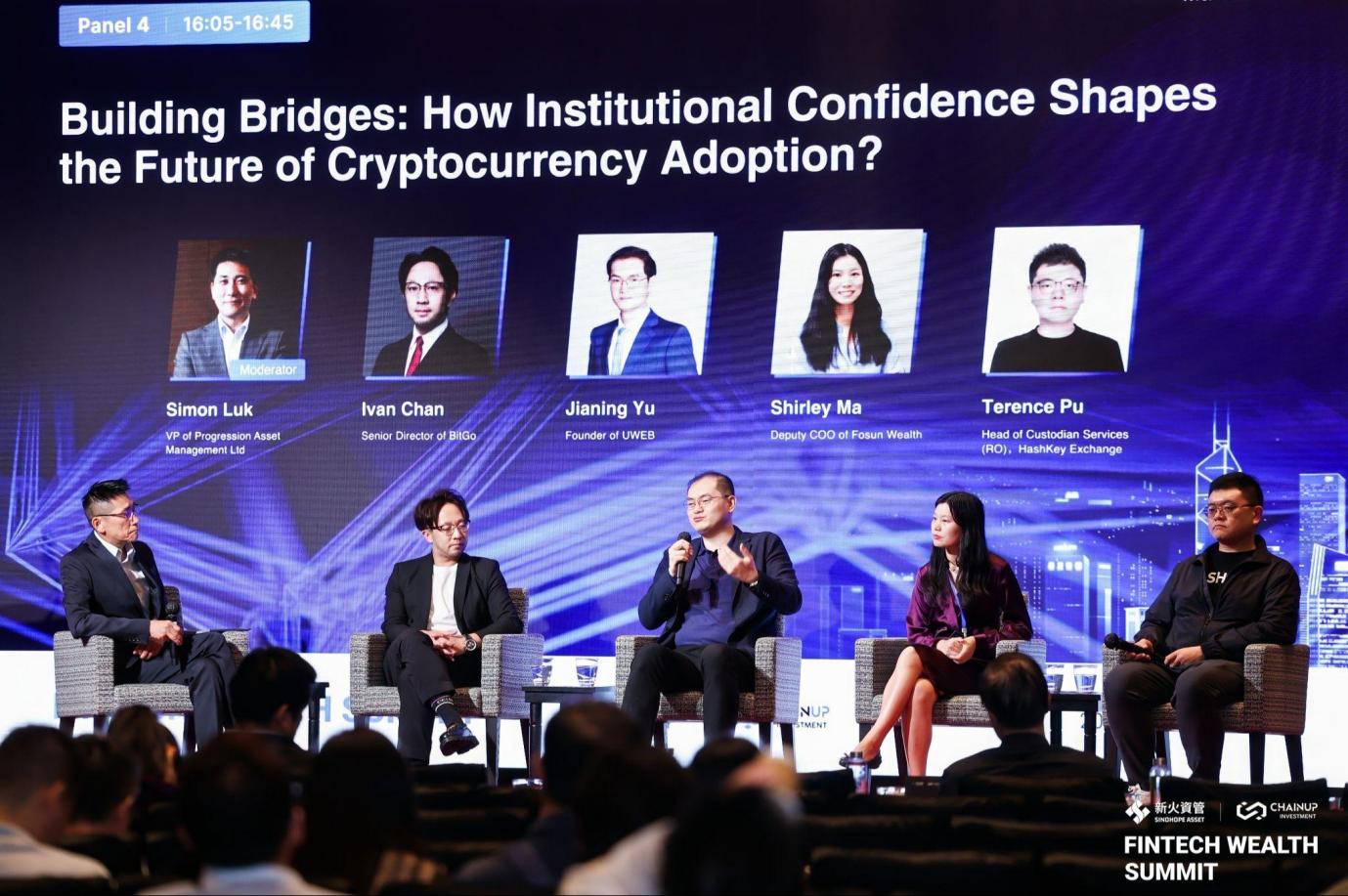
The guests of this conference conducted in-depth analysis and discussion on cutting-edge hot topics such as the current situation and prospects of Hong Kong virtual asset spot ETF products, exploring new narratives of digital finance, and asset allocation strategies under the interest rate cut cycle. As an international financial center, Hong Kong has been committed to promoting the industry development and ecological construction of virtual assets since the release of the Virtual Asset Development Declaration in Hong Kong in October 2022, which has also laid a solid foundation for Hong Kong to become the Asia-Pacific Crypto Capital.











